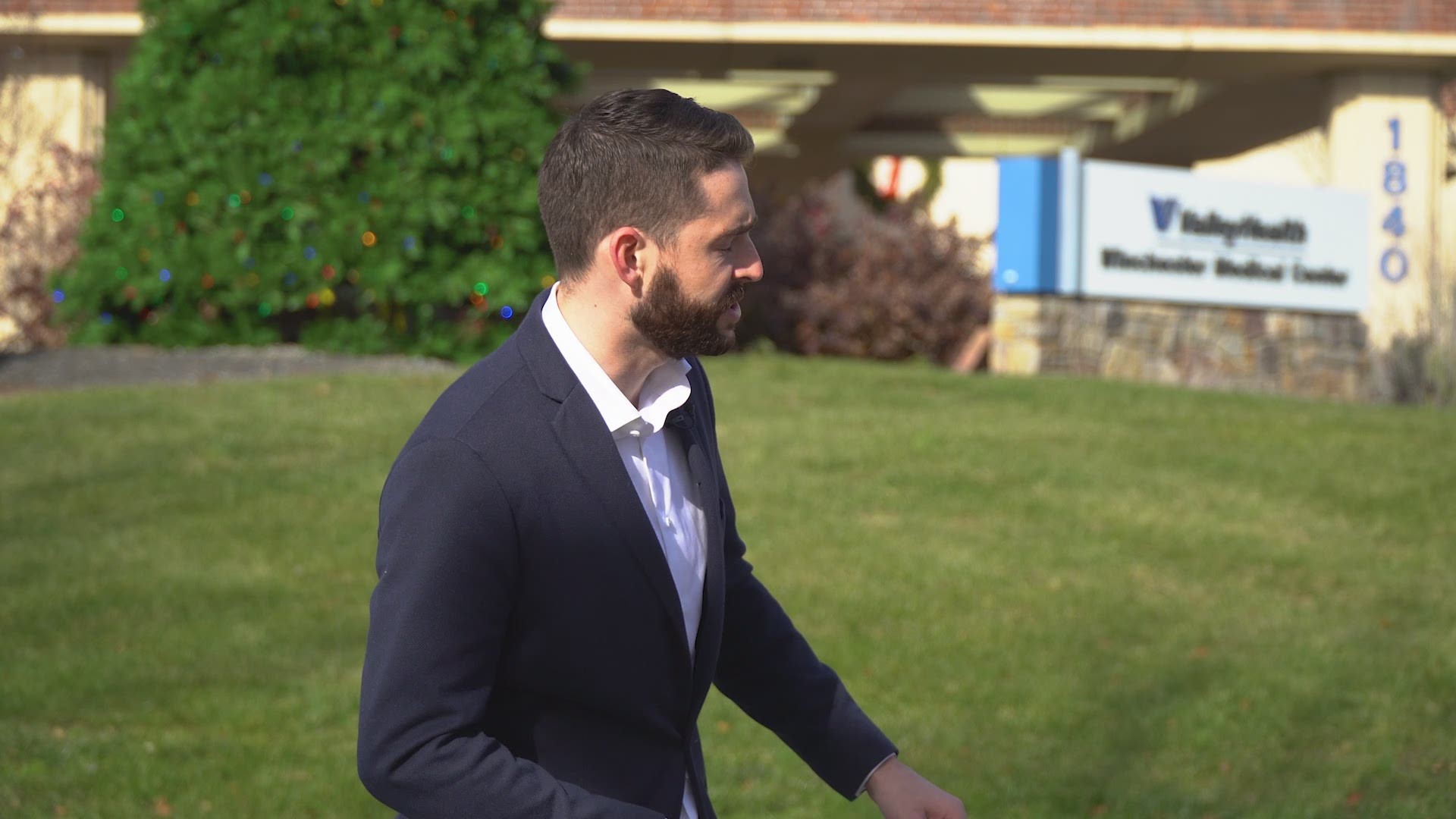WASHINGTON — The delivery is unremarkable, but the moment is monumental.
A FedEx driver wheels a knee-high box into Winchester Medical Center Tuesday morning. Inside is 2,925 doses of Pfizer’s COVID vaccine. Valley Health, which owns the hospital, plans to use every drop within days.
“It’s Christmas,” Winchester’s Pharmacy Director Julie Elrick said. “I’m really excited. It’s such an exciting day.”
A team from Winchester’s pharmacy urgently unpacks the vials, cased in small containers they call “pizza trays.” They quickly shove two in an ultracold freezer purchased last month just for this moment. Elrick says it cost close to $10 thousand. They bought a second, which is awaiting Moderna’s COVID vaccine.
The Pfizer vaccine is sensitive, Elrick says. If it’s exposed to room temperature air for more than three to five minutes, it begins to thaw and must be put in a fridge and used within five days. It can’t be refrozen.
“I have never had a medication in my 26 years as a pharmacist that needed to be stored at this temperature,” Elrick said. “You have to make sure you maintain the integrity of that medication during that whole unpacking process.”
Most of Tuesday’s shipment immediately goes into the freezer. Some doses are repacked in bubble wrap and Ziploc bags, and delivered quickly to Valley Health’s more rural Virginia hospitals.
One tray is placed in a fridge inside Winchester’s pharmacy. The vials need to thaw for three hours ahead of the first vaccinations, scheduled for Tuesday afternoon.
“There’s been months of work and preparation,” Dr. Jeffrey Feit told Verify.
Dr. Feit is leading the Valley Health vaccine operation team. In all, Valley Health has six vaccination sites between Virginia and West Virginia.
“This has been a tremendous year,” Dr. Feit said. “We've taken care of our communities. Our nurses and doctors have put themselves at personal risk. They’ve put their families in some harm's way. And now we get to be part of the end. Or the beginning of the end at least.”
Around 80 patients are currently battling COVID at Winchester Medical Center.
The vaccinations begin in a conference room lined with dozens of distanced chairs. A team of employees and volunteer nurses have been trained to give the shots.
Dr. Benjamin Franklin Lewis, a pulmonologist and critical care physician, is the first to receive a dose. He sits down and within seconds it’s over.
“I’m unbelievably excited and happy,” Dr. Lewis told Verify. “This is the most amazing illness I've seen in my 40 years of being a critical care physician. And we are totally at its mercy. This is a real chance for us to get control.”
Healthcare workers begin cycling through the conference center like a lunch line as Christmas music plays over the cheerful echoing voices. The goal is to vaccinate one healthcare worker every minute.
Now and then, the moment sinks in.
RELATED: VERIFY: Allergic reactions from COVID-19 vaccines in the UK, and what that means for the US
Nurse Kirstin Klutz sits down to get her dose. Suddenly, she’s overcome with emotion. She works with new mothers and their babies. They won’t be vaccinated, at least not for now. This, she believes, is her way to protect them.
“Just hope, for the world,” Klutz tells Verify. “This is like a light at the end of the tunnel.”
Healthcare workers at Winchester Medical Center have treated more than 700 COVID patients this year. One of them was Robert Dusing. He spent a week in the ICU and barely survived, experiencing heart failure and oxygen issues.
“At times, it was a hopeless feeling,” Dusing said. “Certainly a lot of thoughts running through your mind. Are you going to make it out of here? Are you going to be able to do things like coach your kids in basketball again or go to church with your family?"
Dusing is back at work as the nursing director for a Winchester COVID unit. He was among the first healthcare workers to get vaccinated.
“It means the world because I think today is step one of our recovery process,” he said.
Vaccine skepticism is still widespread across the United States. Dr. Feit believes Valley Health will vaccinate around 70 to 80 percent of their staff in the coming weeks, and they’re working to educate the hesitant ones.
“It's new and I'm respectful of that,” Dr. Feit said. “I'm respectful of people who say, I don't know what the long-term risks of something are. I want to inform them and say, well, we don't know what the long-term risks of having Coronavirus are.”
Winchester Medical Center, like so many hospitals, is currently facing its worst COVID surge yet.
“Everyone has a great fear of contracting the disease, yet they come in and continue to care for patients,” Dr. Glen Bouder said. He’s the Medical Director for Critical Care at Winchester and joined the first group of healthcare workers receiving vaccines Tuesday.
“It’s emotional,” Dr. Bouder said, fighting back emotion. “It’s a light at the end of the tunnel.”
Asked where the emotion comes from, Dr. Bouder said it’s the ongoing fight.
“Being in the trenches a long time,” he said. “Being in the ICU, taking care of these folks that are very very sick, many of whom are dying.”
71 COVID patients have died at Winchester Medical Center already. And if vaccinations are the way to stop it, Dr. Bouder thinks it’s worth a shot.
“It’s hope,” he said. “Hope that we’re seeing the end of this.”

